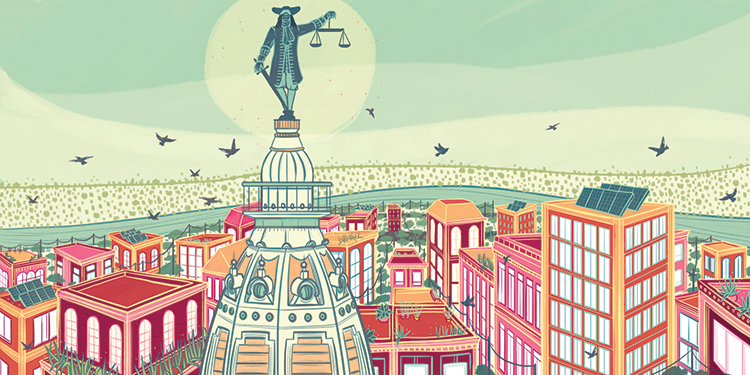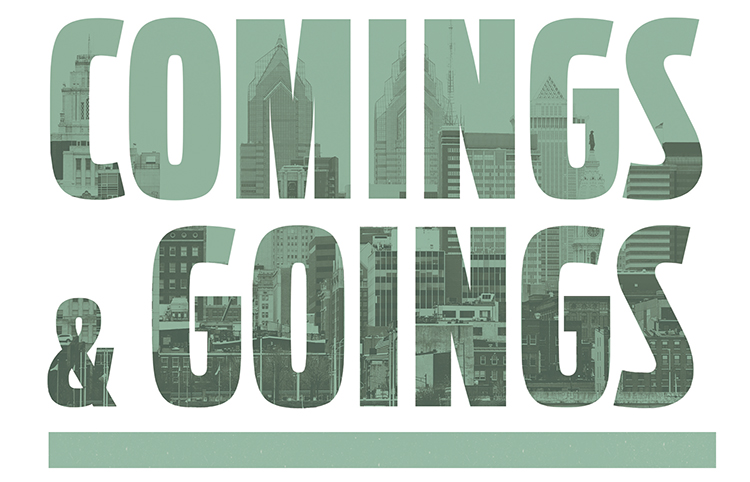Illustration by Kailey Whitman
Our Moment is Now
by Larry Krasner
When people think about a “district attorney” they often think of someone who prosecutes crimes against people and property, and hopefully of someone who protects the rights of crime survivors and the accused alike. I also believe, as a candidate for district attorney, that it should be the DA’s job to use the law to treat substance abuse and mental illness as a public health crisis rather than a crime, and to punish illegal business practices. In addition—and this may be something you haven’t heard from a local DA candidate before—I believe it’s also critical to use the office to protect our environment.
All of these issues are interconnected, much like an ecosystem. When we fail to seek justice in one, the rest suffer. This is why prosecutors must approach equal justice in a holistic manner. If elected, I plan to protect the environment and pursue environmental justice for the people of Philadelphia—especially for our children.
Children in Philadelphia, especially those children living in poverty, suffer from environmentally based and preventable diseases such as asthma, caused by exposure to lead in paint and in water and the harmful effects of polluted soil and groundwater.
In 2015 alone, 2,700 children here tested positive for harmful levels of lead. We suffer from lead exposure at twice the national average, according to a groundbreaking Philadelphia Inquirer report last year. Symptoms often include lower than average IQs and pronounced learning and behavioral difficulties. These setbacks are nothing short of shameful, particularly while our city struggles to adequately address dangerously underfunded public education systems.
Childhood asthma continues to plague our city, too. A 2016 Clean Air Task Force study estimated that thousands of children suffer from persistent asthmatic episodes due in no small part to ground-level smog created by gas and oil companies. The report concluded that this pollution over the years has created “500,000 days of school missed, nearly 2,000 asthma-related emergency room visits, over 600 respiratory-related hospital admissions, and over 1.5 million restricted activity days.”
Illegal dumping of toxic materials by firms and their failure to remediate polluted sites are persistent problems throughout the city as well. The activities of these companies often contaminate our soil and water supply while proper cleanups are frequently left to the taxpayers.
Philadelphians know that there are certain outlying areas of the city still used for industrial purposes. But many fewer know that some of these toxic sites are right in the middle of more centrally located and heavily populated neighborhoods. Residents deserve to have this vital information regarding many of these sites at their disposal. I suspect you would agree that transparency is the keystone to trust between the public and their elected officials.
When companies are found to be poisoning neighborhoods—no matter where they are—we must not only give the public good information, but also aggressively prosecute them and hold them accountable. It’s time to move past giving polluters a “slap on the wrist.”
These injustices disproportionately impact our poorest communities and people of color, and feed the vicious cycle of inequity, poverty and lack of opportunity that ultimately impacts the safety of all. New programs such as Solarize Philly may be able to provide jobs for communities and reduce pollution. Others, such as Rebuild and Philadelphia Water’s green stormwater infrastructure initiative, Green City, Clean Waters, will also create employment while improving our city’s infrastructure and public spaces. Restored parks and recreation centers can have a positive impact on the safety of communities. Ultimately, we can and must work to hold polluters accountable while restoring our communities for future generations.
The Trump administration’s assault on the environment—including the unconscionable decision to gut the Environmental Protection Agency and, most recently, to withdraw our country from the Paris Climate Accord—makes it absolutely vital that municipalities fill this lack of enforcement and challenge the administration’s wanton disregard for clean air, water and soil, all of which are fundamental human rights.
These erosions of federal protections make all Philadelphians more vulnerable to environmental crimes and must be addressed through local solutions and enforcement. There are, in fact, tools that previous administrations in Philadelphia have had at their disposal to hold both large and small companies accountable, but have not used them. As a local prosecutor, I can—and will—utilize the Solid Waste Management Act, the Clean Streams Law and the Air Pollution Control Act to ensure that our environment is safe and that repeat offenders especially are subject to aggressive prosecution. These tools, when used appropriately, can begin to restore environmental justice to communities most impacted by malfeasance.
I recognize that crimes against the environment not only threaten public health, but violate our civil rights, too. I look forward to building coalitions with community advocates and other local and state partners, such as Pennsylvania’s attorney general, to fearlessly tackle these urgent challenges.
Larry Krasner is a veteran criminal defense and civil rights attorney. In May he was
elected as the Democratic candidate for Philadelphia district attorney.



